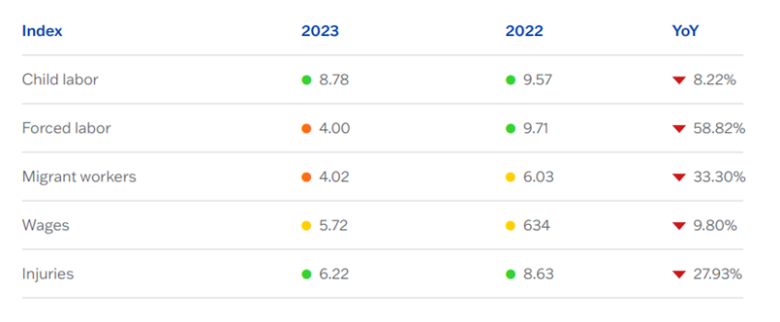Supply Chain ESG Risk Rising in the UK Driven by Rising Forced Labor
Despite the United Kingdom’s developed economy status and the enactment of supply chain due diligence laws dating back to 2015, the nation still faces challenges in addressing one of the most severe forms of supply chain ESG risk: forced labor. The UK saw one of the most significant drops in its risk rating for forced labor over the past year, exhibiting a decrease of 58%.
This high-risk designation for forced labor could be in part due to the country’s reliance on foreign migrant workers, as foreign migrant workers are more likely to be entrapped in instances of forced labor. Our ratings indicate risk for forced labor and migrant workers both shifted to high risk this year, as shown below. The number of foreign migrant workers in the country has been increasing since 2004, making up nearly 18% of its workforce in 2021. The UK is a destination country for foreign migrant workers from Indonesia, India, Nepal, Bangladesh and Pakistan, primarily driven by the labor requirements of domestic agriculture and fishing industries.
United Kingdom Supply Chain Risk profile, ELEVATE 2023

Migrant workers in the UK have faced exploitation and substandard working conditions. Reports picked up by our adverse media scanning tool Sentinel suggest that Turkish and Kurdish workers are being exploited in London. Hundreds of workers reported low wages and no holiday or sick pay, according to a 2022 report from the Refugee and Workers Cultural Association (RWSCA). Nepalese migrant workers have also faced alleged violations, such as inhumane working conditions, isolation, restriction of movement, and withholding of wages. The UK was also one of the top countries to receive Ukrainian refugees after Russia’s invasion into Ukraine. The British government documented at least 169,000 Ukrainians in the country as of April 2023. Among migrant labor groups, refugees are among the most susceptible to forced labor and human rights violations as desperation for work can drive them to unfavorable working environments.
Domestic policy against forced labor has so far been insufficient. While the UK enacted the Modern Slavery Act in 2015, the effectiveness of such laws remains questionable. Our data indicates forced labor risk in the UK is at its highest this year. Forced labor laws can be ineffective for various reasons:
- Limited Scope: Domestic policy typically focuses on the formal sector and might overlook informal sectors where forced labor is prevalent.
- Enforcement Challenges: Enforcing domestic labor laws can be challenging, particularly in countries with large informal sectors or limited resources for regulation and enforcement.
- Economic Incentives and Market Forces: Companies may be incentivized to cut costs and increase profits by exploiting workers, including through forced labor. These economic pressures can sometimes outweigh the deterrence effect of domestic policy, particularly in countries where labor rights are not strongly protected or enforced.
- Complexity of Global Supply Chains: Even if forced labor is prohibited within a given country, companies based there may still be linked to forced labor through their international operations or suppliers. Domestic policy alone cannot effectively regulate these global networks.
Migrant workers often are subject to complex hiring processes, recruitment fees that leave them in debt, and overall lack of knowledge of hiring terms which perpetuate the challenges in mitigating forced labor. This relationship between foreign migrant workers and forced labor risk extends much further than the UK as the prevalence of forced labor for adult migrant workers is more than three times higher than that of non-migrant workers worldwide, according to the ILO.
What can you do to better manage forced labor if operating in the UK?
Onsite audits for UK suppliers must be conducted more regularly and aggressively, especially for suppliers that have been deemed high risk. Prioritizing building relationships with suppliers in the UK to ensure alignment with standards is also essential to mitigating risk for operations there. Sourcing managers can also consider diversifying their supply chain to reduce dependency on high-risk countries or suppliers and using data-driven technology to enhance traceability and transparency. This includes the use of data analytics platforms like EiQ to identify trends and patterns in inherent risk or the use of Artificial Intelligence and Machine Learning tools to analyze supply chain data and predict potential issues, such as delays, shortages, or disruptions.
These blogs are written by ELEVATE staff members or associates and the views and opinions expressed are not necessarily those of ELEVATE.
About the author
